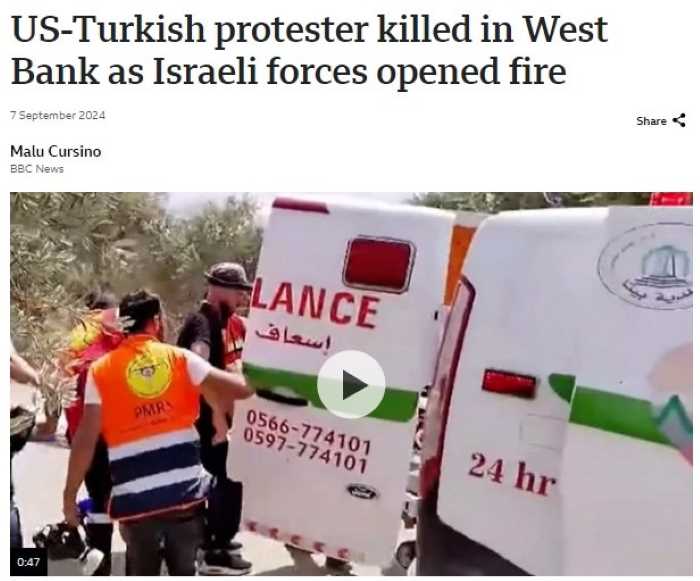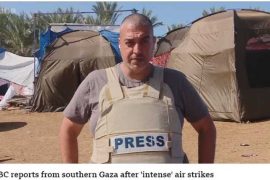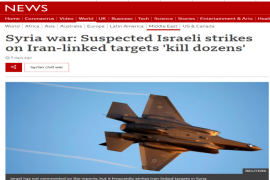Between September 6th and September 14th 2024 the BBC News website published at least four English language items relating to the accidental death of an American-Turkish citizen who had chosen to participate in a violent protest in a foreign country:
- September 6th: “US-Turkish protester killed in West Bank as Israeli forces opened fire”, by Malu Cursino
- September 7th: “UN calls for full inquiry into West Bank shooting”, by Michael Sheils McNamee
- September 11th: “Israel says ‘highly likely’ its troops killed US-Turkish protester in West Bank”, by Frances Mao
- September 14th: “Funeral held for US-Turkish activist killed in West Bank”, by Tom Bennett
The portrayals in those reports of the protest and its location (Beita, in Area B where Israel is responsible for security) refrain from informing readers that such protests have been going on regularly since 2021 – as the BBC should know because it has previously reported them – and have included the use of violence and Nazi symbols. Neither are readers told anything about the background to those protests portrayed by the BBC as being against “settlement expansion”. As was noted here in October 2021:
“…the unrecognised outpost was first set up in 2013 following the murder of Evyatar Borovsky (after whom it was named) at the nearby Tapuach Junction […] it was soon evacuated by the Israeli military authorities. In early May 2021, following the murder of 19-year-old Yehuda Guetta at the same location (which at the time was barely mentioned by Knell and her colleagues), an attempt was made to re-establish the outpost and two months later an agreement was reached for its evacuation.”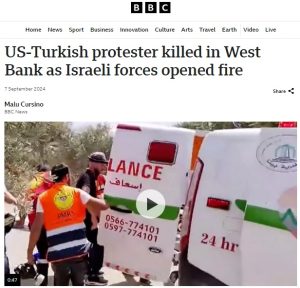
[emphasis added]
- Cursino:
“Aysenur Ezgi Eygi, who had joint nationality, was taking part in a protest against Jewish settlement expansion in the town of Beita near Nablus.”
- McNamee:
“Local media reported that Aysenur Ezgi Eygi, 26, was shot dead by Israeli forces as she took part in a weekly protest against Jewish settlement expansion in the town of Beita near Nablus.”
- Mao:
“Aysenur Ezgi Eygi, 26, had been at a demonstration against Jewish settlement expansion in the town of Beita last Friday when she was shot by Israeli forces.”
- Bennett:
“Hundreds of people have attended the funeral of activist Ayşenur Ezgi Eygi, a joint US-Turkish citizen who was shot dead in the occupied West Bank last week.”
Another notable aspect of these reports is their tepid and uninformative portrayal of the anti-Israel organisation with which Aysenur Ezgi Eygi was involved – the International Solidarity Movement (ISM) – with BBC audiences being told nothing of that organisation’s record of support for terrorism and violence. As documented by the ITIC:
“Besides its involvement in the flotillas, since the end of the intifada the ISM has been active in two main fields:
-
- Sending volunteers to protest demonstrations at focal points of Palestinian-Israeli friction, such as Bila’in: The activities are held in conjunction with local Palestinian popular committees and sponsored by the Palestinian Authority. At the sixth Fatah conference, held in August 2009, the Palestinian Authority adopted a policy of “popular resistance,” which it has employed since. The “popular resistance” is represented as non-violent, but in reality it often employs well-organized, “soft” violence, such as throwing stones at and physically assaulting IDF soldiers, and the occasional Molotov cocktail. In many instances there have been casualties among both demonstrators and Israeli security forces. The “softly” violent activities are committed by Palestinians, but the presence of ISM and other foreign activists at the friction points heightens the tension, whips up emotions and encourages the demonstrators to violence, making it difficult for the Israeli security forces to act.”
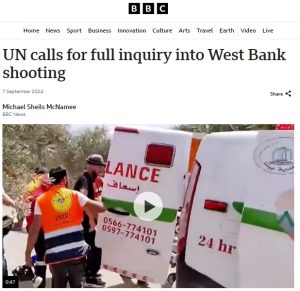
- Cursino:
“A fellow protester told the BBC Friday’s demonstration was Ms Eygi’s first time attending a protest with the International Solidarity Movement, a pro-Palestinian group.”
- McNamee:
“He added that Friday’s demonstration had been Ms Eygi’s first time attending a protest with the International Solidarity Movement, a pro-Palestinian group.”
- Mao:
“Ms Eygi had arrived as a volunteer in the West Bank just a few days before she was killed. […]
But the protest group which Eygi had been with at the time dismissed claims it threw rocks at Israeli soldiers, saying such assertions were “false”. They said their protest had been peaceful. […]
It had been her first time attending a protest in the West Bank, he said. She had been with the International Solidarity Movement (ISM), a pro-Palestinian organisation which takes part in weekly demonstrations at Beita against Israeli settlements.”
Most of the BBC’s reporting of this story relies heavily on claims made by a person described only as an “activist”.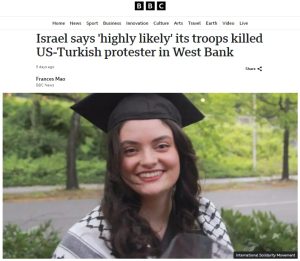
- Cursino:
“Jonathan Pollak, an Israeli activist who was at the same protest as Ms Eygi, said he had heard “two separate shots of live ammunition, shot one after the other… and then I heard another shot”. […]
In an interview with the BBC’s Newshour programme, Mr Pollak was asked about the IDF’s statement, where the Israeli military said security forces had been responding to “a main instigator who hurled rocks at the forces and posed a threat to them”. Mr Pollak said there had been clashes but he felt that soldiers had been “under no threat”.”
- McNamee:
“Jewish-Israeli activist Jonathan Pollak, who was at the protest, told BBC World Service’s Newshour programme he had seen “soldiers on the rooftop aiming”.”
- Mao:
“Jonathan Pollak, an Israeli activist who was at the same protest as Eygi, said he heard two gun shots.
He told the BBC’s Newshour programme there had been “no stone throwing” at Ms Eygi’s location.”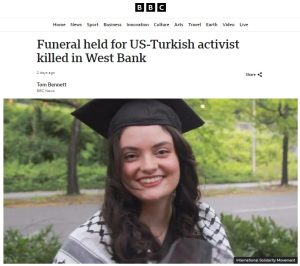
Yonatan (Jonathan) Pollak did indeed appear on the BBC World Service programme ‘Newshour’ on September 6th as well as in some of around ten additional BBC radio items relating to the same story. He also appeared as an “eyewitness” in an uncredited video promoted at the top of the first two BBC News website reports.
Despite his having been extensively quoted in the majority of the BBC News website’s reports, readers were not informed of Pollak’s ‘affiliations’, which include being a founder of the anti-Israel group ‘Anarchists Against the Wall’ and a regular participator in agitprop protests. BBC audiences would of course have found some information about Pollak’s “particular viewpoints” useful in order to be able to put his unverified but widely amplified claims into perspective.
As we see, four BBC News website reports on this story failed to provide BBC audiences with adequate background and context concerning the location of the protest and its history, the anti-Israel organisation with which Aysenur Ezgi Eygi was involved and the main provider of the unverified claims about what happened during the incident that are promoted in these reports.
Related Articles:
BBC’S YOLANDE KNELL PRODUCES PARTIAL REPORTING FROM BEITA
MORE TENDENTIOUS REPORTING FROM THE BBC JERUSALEM BUREAU’S KNELL

